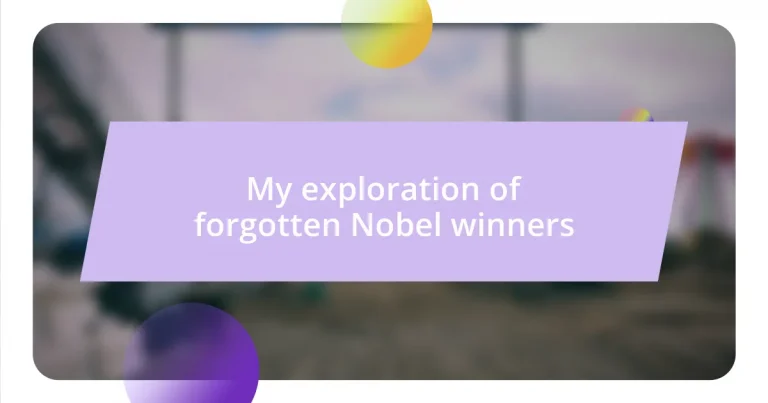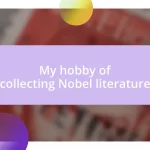Key takeaways:
- The Nobel Prizes honor significant contributions in categories like Peace, Literature, Medicine, Physics, and Chemistry, highlighting both celebrated and overlooked figures.
- Many Nobel laureates, such as José Echegaray and Henri Dunant, have made profound impacts yet remain largely unrecognized due to societal shifts and media focus.
- Exploring the narratives of forgotten winners deepens our understanding of history and challenges us to prioritize diverse contributions in our ongoing discussions.
- Acknowledging these overlooked figures can inspire future generations and enrich our awareness of the interconnectedness of human achievement.
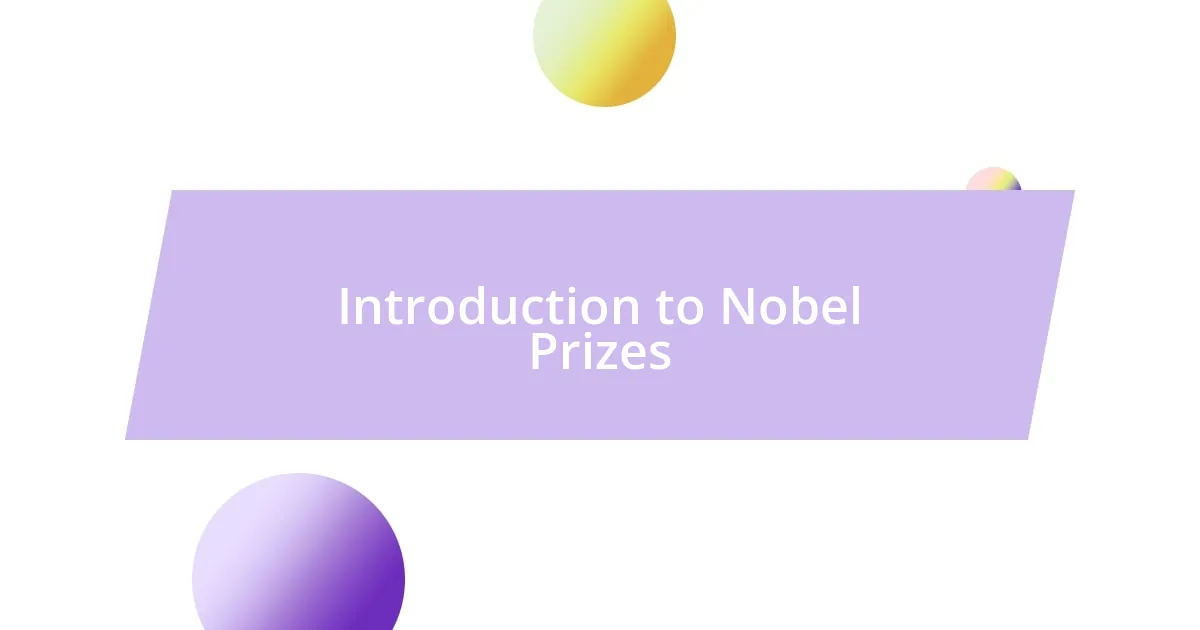
Introduction to Nobel Prizes
The Nobel Prizes are conferred annually in several categories, including Peace, Literature, Medicine, Physics, and Chemistry. Each award recognizes outstanding contributions that have significantly advanced human knowledge or well-being. I often wonder how many brilliant minds go unnoticed in a world where only a handful of names are celebrated.
When I first learned about the Nobel Prizes, I was captivated not just by the prestige but by the stories behind the winners. Imagine the moment when a scientist realizes their work could change the world or an author’s words resonate with generations. It’s these emotional connections to their achievements that make the Nobel stories so compelling—what drives a person to such groundbreaking discovery or profound literary expression?
A common perception might be that the Nobel Prize winners are only the well-known figures, but my exploration revealed a sea of remarkable individuals who, despite their innovative work, drifted into obscurity. This raises an interesting question: what determines the legacies we remember? In delving into the lives of these forgotten laureates, I hope to uncover the narratives that remind us of the diverse and rich tapestry of human achievement.
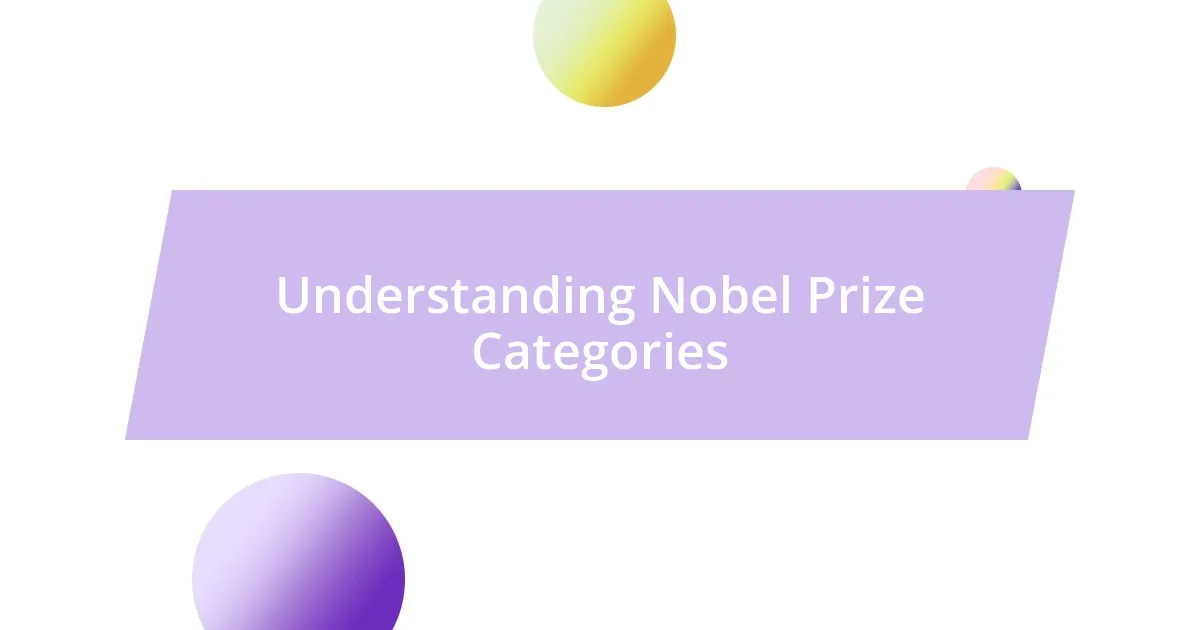
Understanding Nobel Prize Categories
The Nobel Prize categories represent a beautiful mosaic of human achievement. Each category, such as Peace, Literature, Medicine, Physics, and Chemistry, has its own distinct focus, yet they all share a common thread—recognizing those who have made significant contributions to humanity. Personally, I’ve always felt a deep respect for the Peace Prize. It celebrates not just individual efforts but shines a spotlight on the ongoing struggle for global harmony and understanding.
What fascinates me are the nuances within each category. For instance, the realm of Medicine often grapples with complex breakthroughs that can save lives, while Literature oftentimes captures the very essence of human experience through words. Reflecting on this variety, I remember reading a book that exquisitely painted the struggles of a community, making me appreciate the role of literature in fostering empathy. Isn’t it remarkable how different fields can evoke such strong emotions and urge us toward progress?
Lastly, it’s worth examining how these categories can sometimes obscure lesser-known, yet equally deserving, laureates. My journey into the stories of forgotten winners revealed individuals whose groundbreaking work was eclipsed by more prominent figures. This revelation made me ponder the arbitrary nature of fame in our society. Are achievements truly valued based on their visibility, or should the focus be on the impact they create? These thoughts keep me engaged in the continuous exploration of Nobel history.
| Nobel Prize Categories | Focus Area |
|---|---|
| Peace | Efforts toward global harmony |
| Literature | Creative written expression that influences culture |
| Medicine | Medical innovations that improve health |
| Physics | Discoveries that advance our understanding of the universe |
| Chemistry | Chemical breakthroughs that benefit humanity |
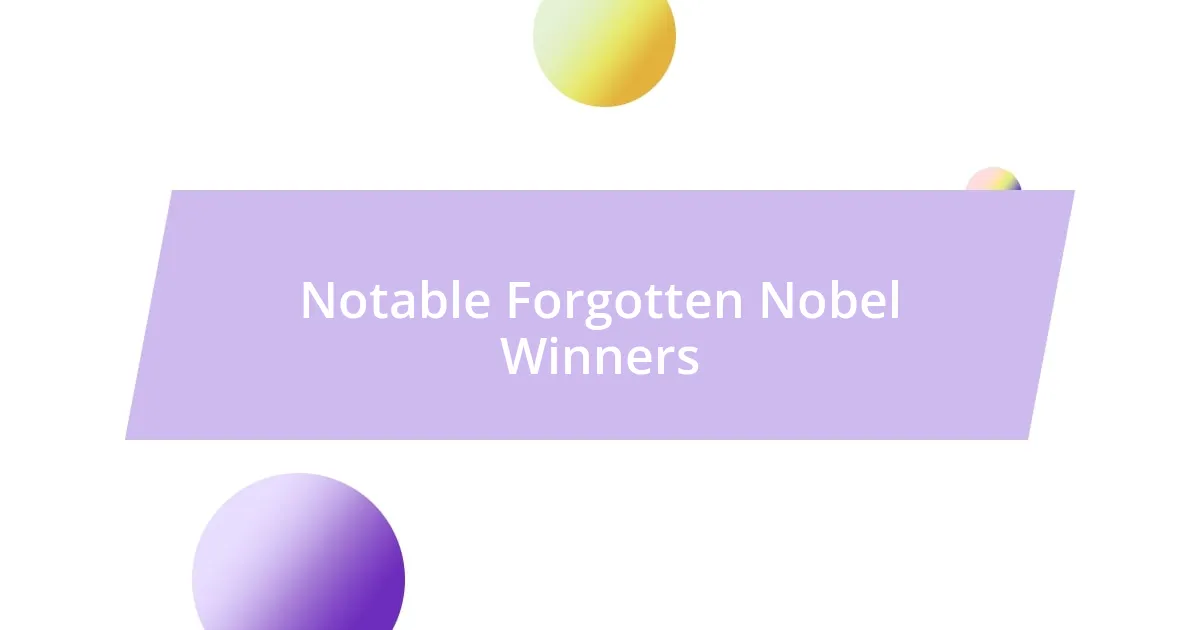
Notable Forgotten Nobel Winners
There are countless names within the archives of Nobel history that, despite their groundbreaking contributions, seem to have faded into the background. One of my favorites is José Echegaray, who won the Nobel Prize in Literature in 1904. His works, filled with complex emotions and social commentary, speak to the heart of human experience. I remember stumbling upon one of his plays in a dusty corner of a library. It was a moment of connection, as his words bridged time and culture, yet few people today know his name.
- José Echegaray (Literature, 1904): Renowned for his deeper philosophical explorations in drama, yet overshadowed by contemporaries.
- Henry Dunant (Peace, 1901): The first Nobel Peace Prize laureate whose advocacy for humanitarian treatment in war is often forgotten.
- Alfred Hermann Fried (Peace, 1911): A key figure in promoting peace and disarmament whose works remain relevant yet largely unrecognized.
- Gustav Klimt (Art, whilst not a Nobel winner, his exclusion from the peace prize discourse highlights how arts contribute to human welfare): His art profoundly reflects societal struggles, echoing the essence of human enduring spirit.
- Rudolf Virchow (Medicine, 1854): Often called the father of modern pathology, yet his revolutionary ideas on social medicine linger in obscurity.
These individuals and their contributions pulse with life, reminding me that history has a way of prioritizing certain narratives while allowing others to slip by unnoticed. Searching through the stories of these forgotten laureates feels like rediscovering lost gems, igniting a passion in me to share their brilliance with others. It’s oddly comforting—like gathering around a campfire, telling tales of those who left indelible marks on our journey, even if their names are not etched in the public consciousness.
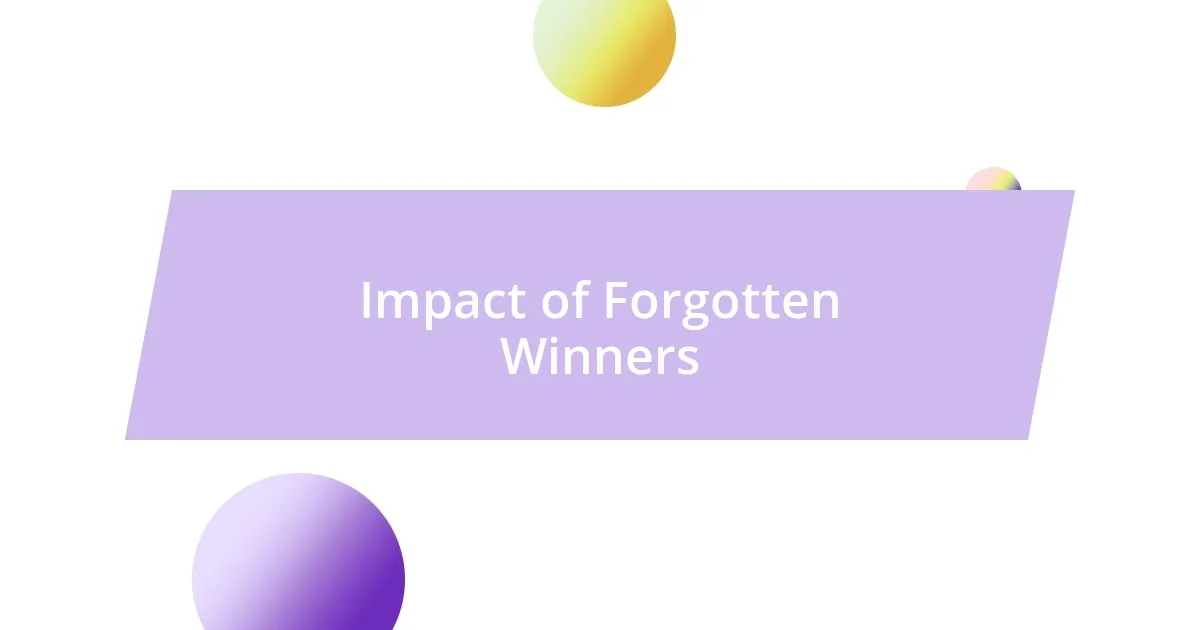
Impact of Forgotten Winners
The impact of forgotten Nobel winners often extends far beyond their immediate recognition. I recall a conversation with a friend who had never heard of Henry Dunant. When I explained how his efforts led to the founding of the Red Cross, my friend was amazed at the ripple effect of his work on humanitarian efforts worldwide. It struck me—how many other individuals have made monumental contributions, only to be overshadowed by louder contemporaries?
Reflecting on these overlooked figures, I can’t help but feel a mix of admiration and sadness. Take Rudolf Virchow, for instance. His ideas about social medicine resonate even today, yet few know his name. Engaging with his story made me reflect on how society often picks favorites, pushing critical narratives into the background. Isn’t it puzzling how the echoes of groundbreaking ideas can fade if they don’t come with the right marketing or celebrity endorsement?
Uncovering the stories of these forgotten winners does more than shine a light on their achievements; it enriches our understanding of history itself. As I delved deeper into Echegaray’s complex world, I felt an emotional connection that transcended time. His reflections on societal struggles prompted me to question how we can ensure that these voices do not vanish entirely. Shouldn’t we strive to revisit and celebrate the contributions that have shaped our world, even if they aren’t always highlighted?

Reasons for Their Overlooked Status
The reasons many Nobel winners find themselves overlooked often hinge on shifts in societal values and interests. For instance, when I first learned about Alfred Hermann Fried, I was surprised to discover that his extensive advocacy for peace was largely eclipsed by more prominent figures of his time. It made me wonder—how many other essential voices are muted by the louder, more sensational narratives?
Another factor is the way media and educational systems prioritize certain contributions over others. Personally, it was a revelation to realize that Rudolf Virchow’s groundbreaking ideas on social medicine barely made it into the conversations I had while studying. I recall feeling frustrated as I dug through textbooks that barely mentioned him. Isn’t it curious how some accomplishments can slip through the cracks simply because they don’t fit neatly into contemporary discussions?
Finally, there’s the undeniable role of timing and context in shaping a legacy. José Echegaray may have penned exquisite works, but they resonated in a different era and social climate. When I first read his play, I felt like I was tuning into a radio frequency meant for a different time. This begs the question—how do we reconcile the brilliance of these past thinkers with today’s fast-paced, digital world? It’s an ongoing conversation we must engage in if we want to ensure these stories don’t fade away.
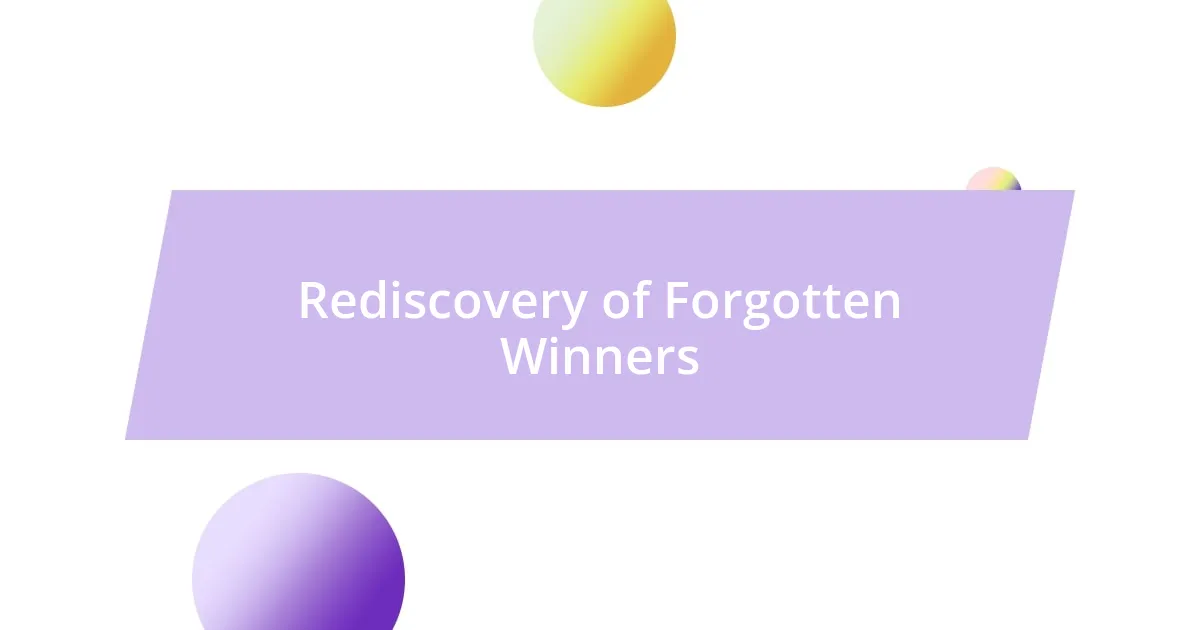
Rediscovery of Forgotten Winners
Rediscovering the stories behind forgotten Nobel winners often uncovers hidden gems of wisdom and innovation that can resonate with our modern challenges. Recently, I stumbled upon the life of Selma Lagerlöf, a novel laureate known for her enchanting storytelling. I was struck by how many people, including myself until that moment, had overlooked her profound impact on literature. This leads me to wonder—how many incredible stories are we missing simply because they’ve faded from the spotlight?
As I navigated through the archives of these overlooked figures, I felt a sense of obligation to bring their narratives back to life. For example, when I learned about the contributions of Richard Willstätter in the field of plant chemistry, I found his research groundbreaking yet seldom discussed. It sparked a realization within me—what if we began to celebrate these figures in our communities? Imagine highlighting their achievements at schools or public lectures. Couldn’t these stories inspire a new generation just as much as the widely known names do?
Ultimately, the journey of rediscovery is not just about individuals; it’s about enriching our collective history. I recall the moment I shared Alfred Bernhard Nobel’s vision for the prizes with my colleagues, emphasizing how he wanted the awards to recognize contributions to humanity. I was met with surprised expressions, reinforcing my belief that sharing these stories can evoke inspiration and reflection. Are we not called to remember and learn from those who have left indelible marks, even if they don’t fit neatly into our contemporary narratives?
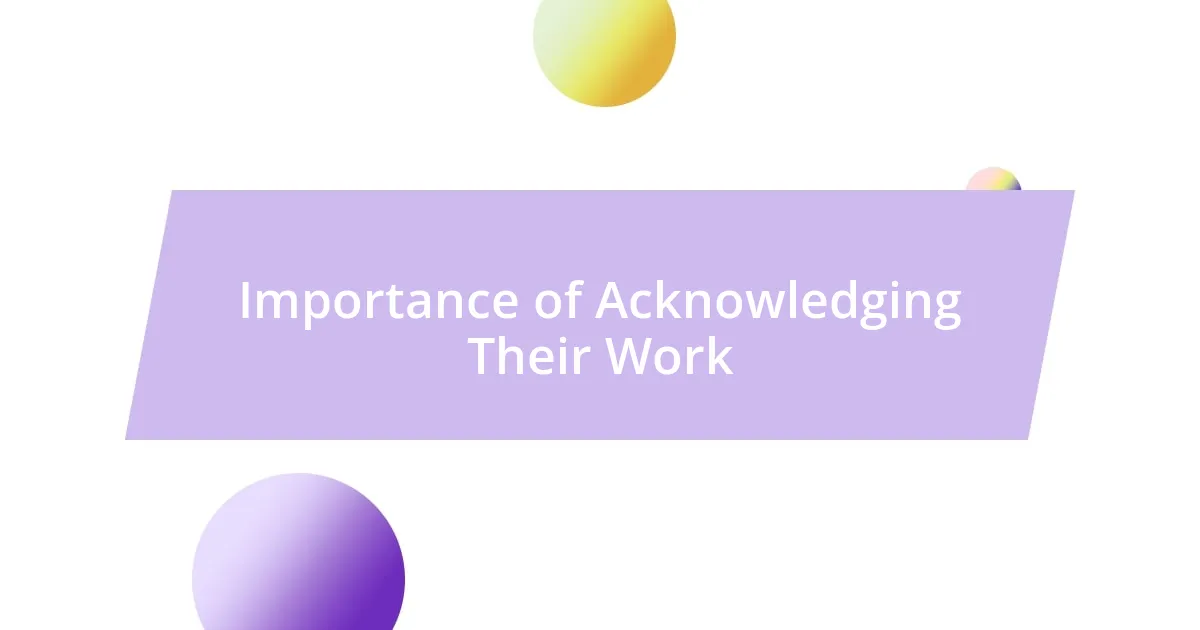
Importance of Acknowledging Their Work
Acknowledging the work of forgotten Nobel winners is essential for appreciating the full tapestry of human achievement. I vividly recall a moment when I stumbled upon the works of Romain Rolland. His ideals about humanism resonated deeply with me, reminding us that contributions to peace and culture transcend time, encouraging us to reflect on our own values today. Don’t you think it’s crucial to recognize voices that challenged the status quo, especially in a world that often prioritizes the loudest over the most insightful?
Diving into their stories reveals how interconnected our histories are. While engaging with the research ofKatherine Mansfield, I was struck by her exploration of identity and the psyche long before our current conversations on mental health began. It made me ponder—how would our understanding of issues like anxiety and depression transform if we actively revisited the insights from these past thinkers? Acknowledge them, and suddenly, we can find context in their words, which can enlighten our current challenges.
When we bring these overshadowed figures back into the light, we not only honor their legacies but also inspire future generations. I remember discussing lesser-known laureates with a group of students, and I could see the spark in their eyes as they learned about the contributions of lesser-known scientists. Their curiosity ignited a dialogue, proving that every narrative, regardless of its prominence, holds value and relevance. Isn’t it fascinating how these stories can motivate young minds to pursue knowledge and innovation in ways we haven’t yet imagined?












